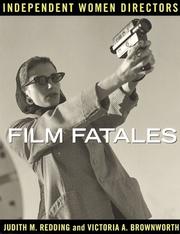| Listing 1 - 6 of 6 |
Sort by
|
Book
ISBN: 9791040112174 9791040112181 Year: 2023 Publisher: Paris : Éditions de la Martinière : Cinémathèque française,
Abstract | Keywords | Export | Availability | Bookmark
 Loading...
Loading...Choose an application
- Reference Manager
- EndNote
- RefWorks (Direct export to RefWorks)
De ses liens avec l'histoire de l'art à sa dimension sociale et politique, Viva Varda ! parcourt les grands thèmes de l'oeuvre polymorphe d'Agnès Varda (1928-2019). La photographe, cinéaste et artiste a déployé sur soixante-dix ans une oeuvre personnelle et fondamentalement ancrée dans le temps. Sa filmographie compte plus de quarante courts et longs-métrages naviguant entre fiction et documentaire, dont les incontournables Cléo de 5 à 7 (1962), Sans toit ni loi (1985), Les Glaneurs et la Glaneuse (2000) et Visages Villages (2017). Précurseuse de la Nouvelle Vague, elle est l'une des rares femmes de sa génération à avoir fait carrière en tant que réalisatrice. Globe-trotteuse et artiste de conviction, Varda témoigne aussi d'une grande attention au monde et aux bouleversements sociaux. Son oeuvre, traversée par les thèmes du féminisme et de la marginalité, demeure d'une très grande actualité. Ce livre, sous la direction de Florence Tissot, accompagne la première exposition rétrospective d'Agnès Varda, conçue par la Cinémathèque française. Il regroupe des textes de spécialistes français et anglo-saxons, ainsi qu'une filmographie commentée par de nombreuses personnalités. Préfacé par Costa-Gavras, il est illustré de plus de 300 documents (archives, images de films, oeuvres d'art, photographies, etc.), dont de nombreux inédits, provenant en grande partie des archives personnelles d'Agnès Varda conservées à Ciné-Tamaris, la société familiale qu'elle a créée, gérée par Rosalie Varda et Mathieu Demy.
Réalisatrices de cinéma --- Varda, Agnès, --- Varda, Agnès --- Women motion picture producers and directors --- Varda, Agnès,

ISBN: 9780822340232 9780822340447 0822340445 0822340232 0822392089 Year: 2007 Publisher: Durham, N.C. Duke University Press
Abstract | Keywords | Export | Availability | Bookmark
 Loading...
Loading...Choose an application
- Reference Manager
- EndNote
- RefWorks (Direct export to RefWorks)
This volume offers introductions to the work of fifteen avant-garde American women filmmakers.
Sociology of the family. Sociology of sexuality --- Film --- Experimental films --- Women motion picture producers and directors --- Films expérimentaux --- Productrices et réalisatrices de cinéma --- History and criticism. --- Histoire et critique --- Cinéma expérimental --- Productrices de cinéma --- Films expérimentaux --- Productrices et réalisatrices de cinéma --- Histoire et critique. --- Media & Communications --- Avant-garde --- Women --- Feminist --- Filmmaker

ISBN: 1878067974 9781878067975 Year: 1997 Publisher: Seattle Seal Press
Abstract | Keywords | Export | Availability | Bookmark
 Loading...
Loading...Choose an application
- Reference Manager
- EndNote
- RefWorks (Direct export to RefWorks)
"Without didacticism, Film Fatales addresses the complexity of... issues, problems and conflicts for women directors. We hope this book will make more people aware of both how accomplished women directors are... and how many obstacles women stil face. Film Fatales is not a semiotic text nor a collection of film theory or criticism. Although we have incorporated some criticism into the profiles of these filmmakers as well as some of our own wealth of information on cinema, our primary goal was to present and contextualize the work of these women by allowing them to speak in their own words about their work, what it means and why they do it, as directors who have had to battle in various ways to get their work made, exhibited and distributed." - Page 22.
Women motion picture producers and directors. --- Women motion picture producers and directors --- Productrices et réalisatrices de cinéma --- Interviews --- Entretiens --- Film --- film --- twintigste eeuw --- filmgeschiedenis --- filmregisseurs --- vrouwen --- 791.471 AAAA --- KFL --- Women moving-picture producers and directors --- Motion picture producers and directors --- Women in the motion picture industry --- Movies --- International --- Film directors --- Book
Book
ISBN: 9780253356680 9780253223418 9786613626431 0253005655 1280596600 9780253005656 0253356687 0253223415 6613626430 Year: 2011 Publisher: Bloomington, Ind. Indiana University Press
Abstract | Keywords | Export | Availability | Bookmark
 Loading...
Loading...Choose an application
- Reference Manager
- EndNote
- RefWorks (Direct export to RefWorks)
Examined within their economic, cultural, and political context, the work of women Maghrebi filmmakers forms a cohesive body of work. Florence Martin examines the intersections of nation and gender in seven films, showing how directors turn around the politics of the gaze as they play with the various meanings of the Arabic term hijab (veil, curtain, screen). Martin analyzes these films on their own theoretical terms, developing the notion of ""transvergence"" to examine how Maghrebi women's cinema is flexible, playful, and transgressive in its themes, aesthetics, narratives, and modes of a
Sociology of the family. Sociology of sexuality --- Film --- Maghreb --- Motion pictures --- Women motion picture producers and directors --- Women in motion pictures. --- Cinéma --- Productrices et réalisatrices de cinéma --- Femmes au cinéma --- History --- Social aspects --- Histoire --- Aspect social --- Cinéma --- Productrices et réalisatrices de cinéma --- Femmes au cinéma --- Africa, North --- In motion pictures. --- Cinema --- Feature films --- Films --- Movies --- Moving-pictures --- Audio-visual materials --- Mass media --- Performing arts --- Women moving-picture producers and directors --- Motion picture producers and directors --- Women in the motion picture industry --- History and criticism --- History.
Book
ISBN: 9780520284463 9780520241527 9780520960084 0520284461 0520241525 0520960084 Year: 2015 Publisher: Oakland, Calif. University of California Press
Abstract | Keywords | Export | Availability | Bookmark
 Loading...
Loading...Choose an application
- Reference Manager
- EndNote
- RefWorks (Direct export to RefWorks)
Among early Hollywood's most renowned filmmakers, Lois Weber was considered one of the era's "three great minds" alongside D. W. Griffith and Cecil B. DeMille. Despite her accomplishments, Weber has been marginalized in relation to her contemporaries, who have long been recognized as fathers of American cinema. Drawing on a range of materials untapped by previous historians, Shelley Stamp offers the first comprehensive study of Weber's remarkable career as director, screenwriter, and actress. Lois Weber in Early Hollywood provides compelling evidence of the extraordinary role that women played in shaping American movie culture. Weber made films on capital punishment, contraception, poverty, and addiction, establishing cinema's power to engage topical issues for popular audiences. Her work grappled with the profound changes in women's lives that unsettled Americans at the beginning of the twentieth century, and her later films include sharp critiques of heterosexual marriage and consumer capitalism. Mentor to many women in the industry, Weber demanded a place at the table in early professional guilds, decrying the limited roles available for women on-screen and in the 1920s protesting the growing climate of hostility toward female directors. Stamp demonstrates how female filmmakers who had played a part in early Hollywood's bid for respectability were in the end written out of that industry's history. Lois Weber in Early Hollywood is an essential addition to histories of silent cinema, early filmmaking in Los Angeles, and women's contributions to American culture.
Film --- Weber, Lois --- Los Angeles --- Motion picture producers and directors --- Women motion picture producers and directors --- Women in the motion picture industry --- Silent films --- Producteurs et réalisateurs de cinéma --- Productrices et réalisatrices de cinéma --- Femmes dans l'industrie cinématographique --- Films muets --- Biography. --- History. --- Biographies --- Histoire --- Weber, Lois, --- Criticism and interpretation --- Biography --- Dictionaries --- United States --- History --- Los Angeles [California] --- Moving pictures, Silent --- Silent motion pictures --- Motion pictures --- Motion picture industry --- Criticism and interpretation. --- Weber, Florence Lois, --- abortion. --- addiction. --- american film industry. --- american movie culture. --- auteur theory. --- biographical. --- birth control. --- capital punishment. --- career. --- censorship. --- consumer capitalism. --- contraception. --- cultural studies. --- director. --- early cinema. --- early hollywood. --- era of silent film. --- female director. --- film studies. --- filmmaker. --- historical. --- hollywood censors. --- hollywood. --- humanity. --- lois weber. --- marriage critique. --- motion picture. --- performing arts. --- producer. --- realistic. --- screenwriter. --- silent film actress. --- silent film. --- social justice. --- split screen.
Book
ISBN: 0262544520 9780262544528 Year: 2022 Publisher: Berlin : Haus der Kulturen der Welt,
Abstract | Keywords | Export | Availability | Bookmark
 Loading...
Loading...Choose an application
- Reference Manager
- EndNote
- RefWorks (Direct export to RefWorks)
Offers intersectional, intergenerational, and international perspectives on nonfiction film- and video-making by and about women, examining practices that range from activist documentaries to avant-garde experiments. Concentrating primarily on the period between the 1970s and 1990s, the contributions revisit major figures, contexts, and debates across a polycentric, global geography. They explore how the moving image has been a crucial terrain of feminist struggle--a way of not only picturing the world but remaking it. The contributors consider key decolonial filmmakers, including Trinh T. Minh-ha and Sarah Maldoror; explore collectively produced films with ties to women's liberation movements in different countries; and investigate the cinematic expressions of tensions and alliances between feminism and anti-imperialist struggles. They grapple with the need for a broader more inclusive definition of the term “feminism”; meditate on the figure of the grandmother; reflect on realist aesthetics; and ask what a feminist film historiography might look like. The book, illustrated with film stills and other images, many in color, offers ten original texts, two conversations, and eight short essays composed in response to historical texts written by filmmakers. The historical texts, half of which are published in English for the first time, appear alongside the essays. --From publisher description.
Nonfiction films --- Feminist films --- kunst --- film --- feminisme --- film en feminisme --- kunst en feminisme --- documentaire --- vrouwen --- activisme --- Ahwesh Peggy --- Akerman Chantal --- 791.43 --- Feminist cinema --- Feminist motion pictures --- Women's liberation films --- Motion pictures --- Nonstory films --- History and criticism --- Films documentaires --- Cinéma et femmes. --- Femmes vidéastes. --- Réalisatrices de cinéma. --- History and criticism. --- Documentary films --- Women motion picture producers and directors --- Féminisme et cinéma --- Femmes vidéastes --- Catalogues d'exposition --- Féminisme --- Cinéma --- Philosophy and psychology of culture --- Film --- feminism --- documentary films --- documentary filmmakers --- cultuurkritiek --- documentary film --- Movies --- Art history --- Film directors --- Book --- Decolonization --- Documentaries --- Intersectionality --- Feminism and motion pictures. --- Feminist films. --- Femmes au cinéma. --- Femmes dans l'industrie cinématographique. --- Films autres que de fiction --- Films féministes --- Féminisme et cinéma. --- Nonfiction films. --- Productrices et réalisatrices de cinéma. --- SOCIAL SCIENCE / Feminism & Feminist Theory. --- Women in motion pictures. --- Women in the motion picture industry. --- Women motion picture producers and directors. --- filmmakers. --- Histoire et critique.
| Listing 1 - 6 of 6 |
Sort by
|

 Search
Search Feedback
Feedback About UniCat
About UniCat  Help
Help News
News